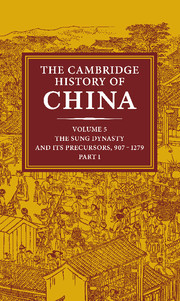Book contents
- Frontmatter
- Introduction: the Sung Dynasty and Its Precursors, 907–1279
- 1 The Five Dynasties
- 2 The Southern Kingdoms between the T’ang and the Sung, 907–979
- 3 Founding and Consolidation of the Sung Dynasty under T’ai-tsu (960–976), T’ai-tsung (976–997), and Chen-tsung (997–1022)
- 4 The Reigns of Jen-tsung (1022–1063) and Ying-tsung (1063–1067)
- 5 Shen-tsung’s Reign and the New Policies of Wang An-shih, 1067–1085
- 6 Che-tsung’s Reign (1085–1100) and the Age of Faction
- 7 The Reigns of Hui-tsung (1100–1126) and Ch’in-tsung (1126–1127) and the Fall of the Northern Sung
- 8 The Move to the South and the Reign of Kao-tsung (1127–1162)
- 9 The Reign of Hsiao-tsung (1162–1189)
- 10 The Reigns of Kuang-tsung (1189–1194) and Ning-tsung (1194–1224)
- 11 The Reign of Li-tsung (1224–1264)
- 12 The Reign of Tu-tsung (1264–1274) and His Successors to 1279
- Bibliography
- Glossary–Index
- References
12 - The Reign of Tu-tsung (1264–1274) and His Successors to 1279
Published online by Cambridge University Press: 28 March 2010
- Frontmatter
- Introduction: the Sung Dynasty and Its Precursors, 907–1279
- 1 The Five Dynasties
- 2 The Southern Kingdoms between the T’ang and the Sung, 907–979
- 3 Founding and Consolidation of the Sung Dynasty under T’ai-tsu (960–976), T’ai-tsung (976–997), and Chen-tsung (997–1022)
- 4 The Reigns of Jen-tsung (1022–1063) and Ying-tsung (1063–1067)
- 5 Shen-tsung’s Reign and the New Policies of Wang An-shih, 1067–1085
- 6 Che-tsung’s Reign (1085–1100) and the Age of Faction
- 7 The Reigns of Hui-tsung (1100–1126) and Ch’in-tsung (1126–1127) and the Fall of the Northern Sung
- 8 The Move to the South and the Reign of Kao-tsung (1127–1162)
- 9 The Reign of Hsiao-tsung (1162–1189)
- 10 The Reigns of Kuang-tsung (1189–1194) and Ning-tsung (1194–1224)
- 11 The Reign of Li-tsung (1224–1264)
- 12 The Reign of Tu-tsung (1264–1274) and His Successors to 1279
- Bibliography
- Glossary–Index
- References
Summary
dynasty besieged
As it approached its end, the Southern Sung dynasty had been weakened by spendthrift emperors, disabled by squabbling bureaucrats, and stretched to the brink of bankruptcy by the costs of wars that had lingered for six decades. By the 1260s a certain disillusionment and fatalism hung over Lin-an. The emperor, Li-tsung (r. 1224–64), seemed to be evading despair by escaping into lechery. His high officials evaded responsibility for their failures by engaging in political vendettas. Attempts at reviving economic prosperity through government initiatives had lost their appeal after several disastrous failures. The active pursuit of peace was similarly abandoned. Adding to this malaise was the inability of the Chao imperial line to provide suitable heirs on a regular basis.
Three of the six Southern Sung emperors before 1275 did not produce a son who survived him, and this lack of patrilineal succession necessitated the adoption of sons from less prestigious branches of the imperial clan. Kao-tsung, Ning-tsung, and Li-tsung all had lengthy reigns that began in early adulthood and continued for three decades or more, yet they all died without sons to succeed them. Hsiao-tsung, Kuang-tsung, and Tu-tsung (r. 1264–74) were succeeded by infant sons who were ineffectual rulers. Historical records provide few clues as to why sons were in short supply. What is known is that the absence of a proper heir, namely the son of the emperor’s primary wife, created political instability at the time of succession.
- Type
- Chapter
- Information
- The Cambridge History of China , pp. 913 - 962Publisher: Cambridge University PressPrint publication year: 2009

